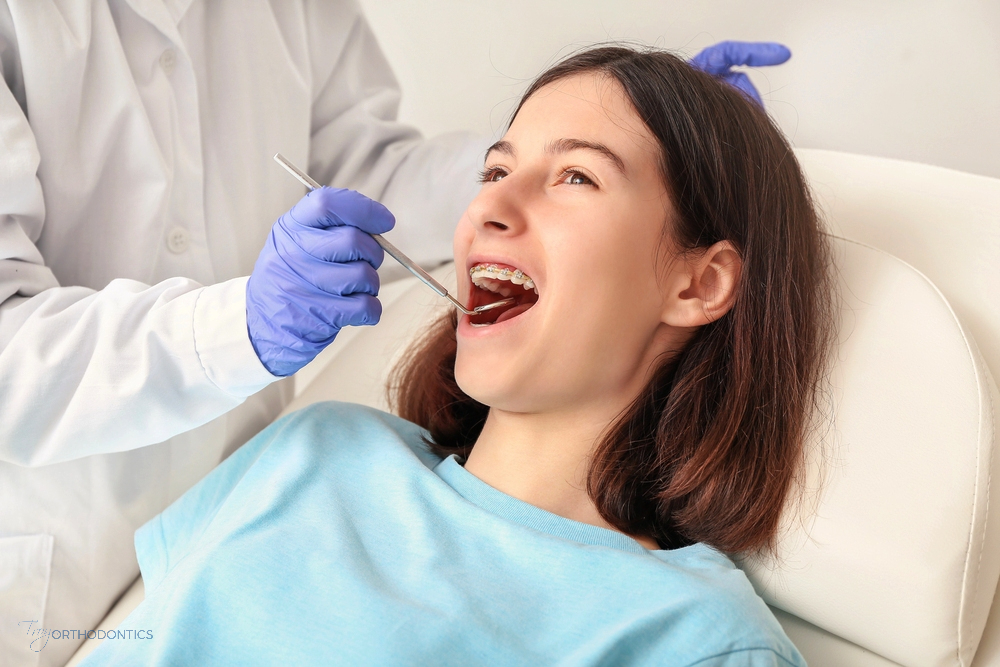Are you wondering how to fix overbite in Little Falls, NJ? Start by scheduling a consultation with a local orthodontist who can assess your specific case. They might recommend traditional braces, clear aligners like Invisalign, or even surgery for more severe cases.
At Troy Orthodontics, we specialize in helping patients achieve healthier, more confident smiles through expert orthodontic care. Our team provides personalized solutions, including braces, Invisalign, and advanced treatments for severe cases. This article will explore overbite causes, treatment options, and what to expect during your journey to better oral health.

Understanding Overbite
What Is an Overbite?
An overbite happens when the upper teeth cover the lower teeth too much. A small overlap between the upper and lower teeth is normal. However, when this overlap becomes excessive, it can cause problems. Overbites are classified as mild, moderate, or severe, depending on how far the upper teeth overlap the lower ones.
Causes of Overbite
Many factors can contribute to an overbite. These include:
- Genetics: Your jaw shape or tooth size may be influenced by family traits.
- Childhood Habits: Prolonged thumb-sucking or pacifier use can push teeth forward over time.
- Teeth Grinding: Grinding can gradually wear down and move teeth out of alignment.
- Missing Teeth: When teeth are missing, the surrounding teeth may shift, causing alignment issues.
Symptoms and Complications
An overbite can cause various symptoms and complications, such as:
- Worn Teeth: Teeth may appear flattened or damaged over time due to misalignment.
- Jaw Pain: Extra pressure on the jaw due to an overbite can lead to discomfort or even headaches.
- Speech Challenges: Certain words may become harder to pronounce.
- Aesthetic Concerns: A noticeable overbite may make you feel less confident about your smile.
By addressing these symptoms early, you can avoid long-term dental and facial issues.
The Impact of an Overbite
If left untreated, an overbite can lead to severe dental and health problems, including tooth decay, gum disease, and difficulty eating or speaking. It may also affect facial symmetry and the overall balance of your features. Correcting an overbite not only enhances your smile but also protects your oral health.
Consultation with an Orthodontist in Little Falls, NJ
Why Professional Help Matters
Seeking professional advice is the best way to correct an overbite. At Troy Orthodontics in Little Falls, NJ, we provide expert care and customized treatment plans designed to suit your unique needs.
What to Expect at Your First Visit
During your initial consultation, you can expect:
- Thorough Examination: We’ll use X-rays, 3D scans, or photos to assess the position of your teeth and jaws.
- Discussion of Concerns: You can share your questions and goals with our orthodontist.
- Customized Plan: We’ll review treatment options suited to your specific case.
From the first visit, we guide you step by step toward better oral health and a stunning smile.
How to Fix Overbite in Little Falls: Treatment Options
At Troy Orthodontics, we offer several proven methods to fix overbites:
1. Braces
Braces are a traditional and highly effective treatment option for overbites.
- How They Work: Brackets and wires are used to gently shift teeth into their correct positions over time.
- Modern Options: We offer ceramic braces that are less noticeable for those seeking a more discreet look.
- Versatility: Braces work for mild, moderate, and severe overbites.

2. Invisalign
If you prefer a nearly invisible treatment, Invisalign clear aligners may be the right choice. Professionals like Dr. Taylor Kauffman, an expert orthodontist in New Braunfels, TX, highlight Invisalign as a nearly invisible solution designed to address mild to moderate overbites discreetly.

- Discreet Appearance: Invisalign trays are clear and hard to notice.
- Removable Convenience: You can take them out during meals or when brushing your teeth.
- Custom Alignment: Each aligner is designed to fit your teeth perfectly and adjusts as needed.
3. Bite Plates and Expanders
For improving jaw alignment, we may use bite plates or expanders.
- Bite Plates: These appliances guide the jaw into better alignment.
- Expanders: Used to widen the upper jaw in younger patients, creating additional space for teeth.
4. Jaw Surgery
For advanced cases, jaw surgery may be required. This option is typically necessary when other methods cannot entirely correct the alignment.
The Treatment Process
We follow a clear process at Troy Orthodontics to ensure successful treatment results:
Developing a Personalized Plan
Your plan will include:
- The best solution for your overbite
- A detailed timeline and expected milestones
- A transparent overview of the costs and financing options available
Step-by-Step Treatment
- Starting Treatment: Whether using braces, aligners, or other devices, we’ll begin correcting your bite.
- Regular Adjustments: Consistent follow-ups ensure your treatment stays on track.
- Completion Stage: After your overbite is corrected, retainers will help maintain your new alignment.
Maintaining Oral Hygiene During Treatment
Good oral hygiene is crucial when undergoing orthodontic care.
Why It’s Important
Braces and aligners can trap food particles, increasing the risk of tooth decay. Staying on top of your oral care ensures a healthy smile during and after treatment.
Tips for Success
- Brush Twice Daily: Use a soft toothbrush to clean around wires and brackets.
- Floss Daily: Use floss threaders or a water flosser to clean between teeth.
- Clean Aligners: If using Invisalign, rinse your trays regularly and soak them in a cleaning solution.
Financing Options for Overbite Treatment in Little Falls, NJ
At Troy Orthodontics, we provide flexible payment options to make treatment affordable.
Insurance Coverage
Our team will work with your insurance provider to maximize benefits for your braces, Invisalign, or other treatments.
Payment Plans
For out-of-pocket expenses, we offer easy financing plans to spread the cost over time.
Expected Outcomes
Correcting an overbite improves your oral health while enhancing your appearance.
Health Benefits
- Better Bite Function: Easier chewing and less strain on your teeth and jaw.
- Healthy Alignment: Reduced risk of tooth wear and jaw discomfort.
- Improved Speech: You’ll be able to pronounce words more clearly.
Aesthetic Benefits
A properly aligned smile boosts your confidence and enhances your overall look.
Start Your Smile Journey with Troy Orthodontics
If you’ve been searching for how to fix overbite in Little Falls, NJ, we’re here to help. Troy Orthodontics combines expert care with advanced techniques to deliver the best results. Whether you need braces, Invisalign, or specialized orthodontic devices, our team provides a comfortable and customized experience.
Don’t wait—schedule your consultation at Troy Orthodontics today and take the first step to a healthier, straighter smile!
About the Authors
Dr. Tuhina Roy – Orthodontist in Little Falls, NJ
Dr. Taylor Kauffman – Orthodontist in New Braunfels, TX
Frequently Asked Questions
How much does it cost to fix an overbite with braces?
On average, you might be looking at anywhere from $3,000 to $7,000. Traditional metal braces tend to be on the lower end of the price range, while options like ceramic braces or Invisalign can be a bit pricier. It’s always a good idea to check with your orthodontist for a more personalized estimate and see if your dental insurance can help cover some of the costs.
What age should an overbite be corrected?
Orthodontists recommend evaluating children for potential overbite correction around the ages of 7 to 10. This is because, during these early years, a child’s jaw is still developing, making it easier to guide teeth into their proper positions. However, it’s never too late to seek treatment, and many adults successfully correct their overbites later in life. Ultimately, the best time to address an overbite is when you and your orthodontist decide it’s right for you or your child!
Does overbite get worse with age?
An overbite can indeed become more pronounced over time. This can happen due to natural changes in our teeth and jaw alignment as we grow older, or even due to habits like teeth grinding or not wearing a retainer after orthodontic treatment. But don’t worry too much! Regular dental check-ups can help keep an eye on things and ensure your smile stays healthy and happy.
